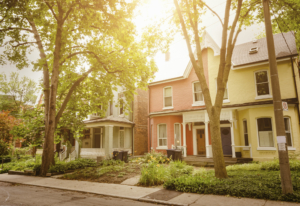A nationwide inventory shortage is hampering the housing market’s growth, but the shortage isn’t uniformly affecting every market. In fact, a market is more likely to have a housing shortage if its housing prices have recovered to pre-crash highs, according to a recent study by Trulia.
There were 980,550 homes listed for sale in the first quarter of 2017, good for the lowest level on record and a 5 percent dip over the same time last year, Trulia reports. It’s the eighth consecutive quarter that housing inventory has shrunk.
It’s not just that there aren’t enough homes for sale that is hurting the housing market, it’s where the inventory is lowest (big and desirable markets with rebounding home prices) and what kind of homes are unavailable (starter homes that are in the most demand) that hurt the most.
It seems intuitive that, as home values rebound in major American cities, homeowners would be more willing to sell. But Trulia’s study found that the opposite is actually true: markets with greater home value recovery have experienced larger decreases in inventory over the past five years.
That’s because the owners of starter-level homes might have seen their property’s value rise, but it’s not enough to cash in and buy a bigger house.
“This is perhaps due to the tricky conceptual relationship between home values and inventory: too little recovery might make it difficult for homeowners to sell their home but cheap to buy one, while too much recovery might make it easy for them to sell but difficult to buy.”
Starter homes most impacted
A strong recovery impacts the inventory of starter homes the most, Trulia’s research finds. Nationwide, the inventory of starter homes has dropped by nearly 9 points compared to this time last year, while trade-up home inventory dropped 8 points and premium inventory dropped 2 percent.
The significant dip in starter and trade-up home inventory compared to premium homes is significant because most people seeking to enter the housing market are looking at those two price points, Trulia reports.
Buyers of a starter home will have to pay 38 percent of their income, an increase of 3 percent since last year. Premium home buyers would have to spend 14 percent of their income, a less than 1-percent increase year-over-year. In other words, low inventory pushing starter-home prices up keeps more first-time buyers out of the market than does the scarcity and price increase in premium homes keep more wealthy people from buying.
| Cities | Median starter home price | Median trade-up home price | Median premium home price | % of income needed to buy starter home | % of income needed to buy trade-up home | % of income needed to buy premium home |
|---|---|---|---|---|---|---|
| Chicago | $88,667 | $175,000 | $361,600 | 30.6 | 21.2 | 12.9 |
| Miami | $71,967 | $159,966 | $479,275 | 27.9 | 21.5 | 11.3 |
| Atlanta | $49,900 | $125,000 | $299,933 | 14.9 | 14.3 | 7.7 |
| Boston | $199,567 | $321,633 | $629,600 | 49.3 | 27.1 | 14.3 |
| Houston | $70,344 | $129,947 | $279,933 | 21.9 | 14.7 | 7.7 |

